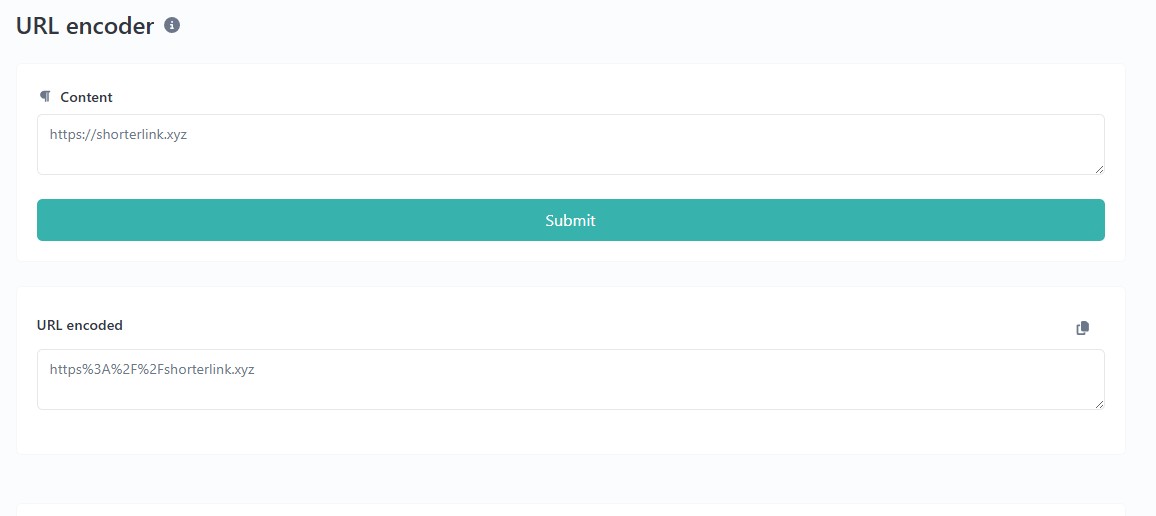
URL Encoder: Making Web Links Safe, Clean, and Functional
Created on 12 October, 2025 • Converter Tool • 0 views • 4 minutes read
Learn what a URL encoder is, how it works, and why it’s essential for clean, secure links. Discover how shorterlink.xyz uses URL encoding to ensure safe and functional shortened URLs.
In the digital world, URLs are the bridge between users and web content. Whether you're clicking a link, submitting a form, or sharing a web address, your browser relies on URLs to reach the correct destination. But not all characters can be safely used in a URL—some must be translated into a readable and accepted format. That’s where a URL encoder comes in.In this article, we’ll explore what a URL encoder is, how it works, why it's important, and how it supports platforms like shorterlink.xyz in delivering fast, safe, and functional link services.
What Is a URL Encoder?
A URL encoder is a tool or process that converts unsafe or special characters in a URL into a format that can be safely transmitted over the internet. This process is also known as percent encoding, where specific characters are replaced with a % followed by two hexadecimal digits.
For example, a space character ( ) is converted into %20. Characters like #, ?, &, and = can interfere with how URLs function, so they are encoded to avoid confusion or errors.
Why Is URL Encoding Important?
1. Ensures Link Functionality
Web browsers and servers interpret special characters in URLs in specific ways. Without encoding, a URL that contains certain characters might not work as expected or could break altogether. Encoding ensures that every character is correctly read and processed.
2. Improves URL Safety
Encoding removes ambiguity from URLs. For instance, if a user inputs a value with symbols or non-English characters into a search bar or form, the URL encoder converts it into a safe format that won’t disrupt the page or query.
3. Supports Internationalization
Modern websites are global, and so are their users. A URL encoder can handle Unicode characters, allowing users to include characters from different languages (like Chinese, Arabic, or emojis) in web addresses—once they’re properly encoded.
How URL Encoding Works
URL encoding follows a simple logic: unsafe characters are replaced by a percent sign (%) followed by a two-digit hexadecimal representation of the ASCII value of that character.
For example:
: becomes %3A
/ becomes %2F
@ becomes %40
This ensures that URLs remain intact and are interpreted correctly by all systems, browsers, and servers.
Most modern applications and web tools automatically apply URL encoding in the background, but having a dedicated URL encoder tool is helpful for testing, development, or manual link creation.
Real-World Use Cases for URL Encoding
Forms and Query Parameters
When users submit forms on websites, their input is often included in the URL as query parameters. If the input contains special characters or spaces, these need to be encoded to ensure the form data is transmitted and interpreted correctly.
APIs and Webhooks
Many APIs and webhooks use URLs to send or receive data. Without URL encoding, a malformed request could cause errors or even fail completely. Encoding makes these interactions reliable and standardized.
Sharing and Shortening URLs
When you share a link, especially one that includes search terms, tracking codes, or dynamic data, URL encoding makes sure the full address remains clickable and functional.
How shorterlink.xyz Uses URL Encoding
At shorterlink.xyz, URL encoding is essential to ensuring every shortened link works as expected—no matter what characters are included in the original URL.
Here's how URL encoding benefits shorterlink.xyz:
Clean and Functional Links: When users paste a long or complex URL into the shortening tool, shorterlink.xyz uses URL encoding to clean it up and remove potentially problematic characters.
Accurate Redirection: During redirection, the platform decodes the URL and ensures users are sent to the correct destination—without broken links or malformed addresses.
Improved Security and Compatibility: Whether it's a URL with emojis, languages other than English, or embedded UTM codes, encoding ensures it’s stored and delivered safely across different browsers and devices.
By handling encoding and decoding in the background, shorterlink.xyz allows users to shorten even the most complex links with confidence.
Benefits of Using a URL Encoder
Better Link Integrity
Encoded URLs work reliably across different browsers, operating systems, and devices. They reduce the risk of errors and misinterpretation.
Enhanced User Experience
With URL encoding, users can include custom values, special characters, and non-English text in their links—without worrying about how it will render.
Developer-Friendly
For developers building web apps, API integrations, or dynamic links, a URL encoder ensures data is safely passed through URLs without conflict or failure.
Limitations and Considerations
Although URL encoding is essential, it’s important to remember:
Over-encoding can break URLs. If a character is encoded multiple times unnecessarily, it can create unreadable or non-functional links.
Not all characters need encoding. Letters, numbers, and a few safe symbols (like -, _, .) are allowed in URLs without encoding.
Understanding when and what to encode helps maintain clarity and efficiency.
Conclusion
A URL encoder is a vital tool for anyone working with the web. From developers and digital marketers to everyday internet users, URL encoding ensures that links remain safe, functional, and compatible across all platforms.
At shorterlink.xyz, URL encoding happens behind the scenes, allowing users to shorten, share, and access links without worrying about broken URLs or strange character issues. Whether you're creating a branded short link or sharing a long search result, encoding protects and preserves your data.
By understanding how URL encoding works, you can use tools like shorterlink.xyz more effectively and ensure that your links are always working at their best.